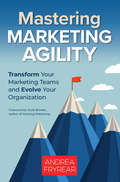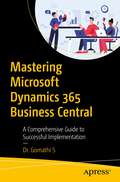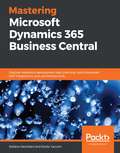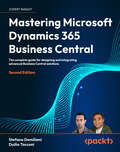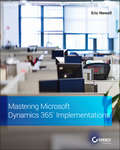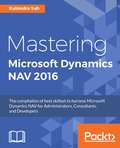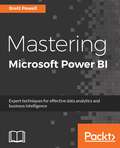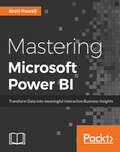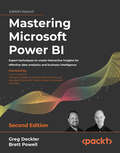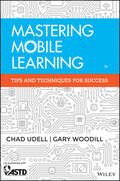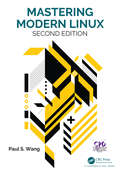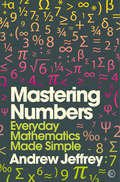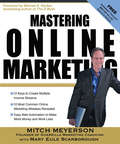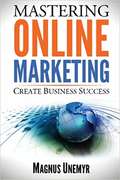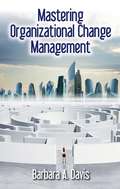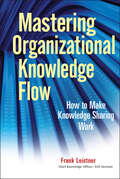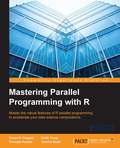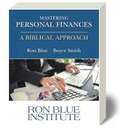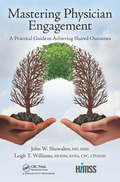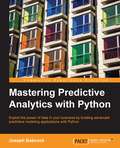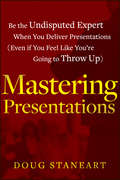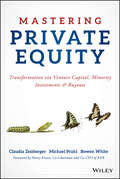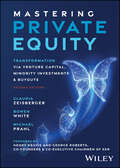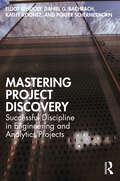- Table View
- List View
Mastering Marketing Agility: Transform Your Marketing Teams and Evolve Your Organization
by Andrea FryrearThe leading authority on agile marketing shows how to build marketing operations that can pivot freely and yet remain committed to priorities.As a marketer, are you tired of chasing marketing fads and algorithm rumors that seem to change every couple of months? This guide to building the perfect marketing department will help you achieve the latest and greatest without having to rebuild your operations from scratch every time the wind shifts. Agile strategies have been the accepted modus operandi for software development for two decades, and marketing is poised to follow in its footsteps. As the audiences we market to become ever more digital, agile frameworks are emerging as the best and only way to manage marketing. This book is a signpost showing the way toward the agile future of marketing operations, explaining how every role, from social media intern up to chief marketing officer, can work in unison, responding to the market's demanding challenges without losing focus on the big picture.You will learn what it takes for marketing agility to thrive—customer focus, transparency, continuous improvement, adaptability, trust, bias for action, and courage—along with the antipatterns that can drag you down. Most important, you will learn how to implement the systems, strategies, and practices that will truly transform your marketing operations.
Mastering Microsoft Dynamics 365 Business Central: A Comprehensive Guide to Successful Implementation
by Dr. Gomathi SGet ready to ace Microsoft Dynamics 365 Business Central and usher in an era of streamlined efficiency, enhanced productivity, and growth. This guide book is your trusty companion on your journey to becoming an ERP implementation pro. The book will take you through the entire implementation process, from initial planning to successful deployment and beyond.The book starts with an introduction to Business Central and the benefits of its implementation. It discusses pre-implementation planning and vendor selection and partnership, and you will learn budgeting and timeline along with evaluating implementation partners. You will go through project management methodologies and learn about resource allocation and team roles. Data migration and cleansing are discussed, along with configuration and customization. You will learn about change management and user adoption, as well as Integration with existing systems. The book takes you through testing and quality assurance, and you will understand how to prepare for Go-Live. You also will learn common implementation challenges and solutions, and future trends in ERP and Business Central.After reading this book, you will be able to discover the full potential and make the most out of Microsoft Dynamics 365 Business Central.What Will You LearnMaster the complete process of Microsoft Dynamics 365 Business Central implementationImplement effective strategies to drive user adoption and overcome resistance to changeStay ahead of the curve by exploring emerging trends in the ERP landscapeUtilize practical tools and checklists to streamline implementation tasksGain insights from case studies for practical implementation strategiesWho This Book Is ForProject managers, business analysts, and ERP consultants
Mastering Microsoft Dynamics 365 Business Central: Discover extension development best practices, build advanced ERP integrations, and use DevOps tools
by Stefano Demiliani Duilio TacconiDevelop customized business management solutions with the latest features of Microsoft Dynamics 365 Business Central Key Features Learn Dynamics 365 Business Central, the next generation of Dynamics NAV Explore advanced topics for handling complex integrations such as using APIs, OData, and Azure Functions Discover best practices for developing SaaS extensions and moving existing solutions to the cloud Book Description Dynamics 365 Business Central is an all-in-one business management solution, which is easy to adopt and helps you make smarter business decisions. This book is a comprehensive guide to developing solutions with Microsoft ERP (in the cloud and also on-premises). It covers all aspects of developing extensions, right from preparing a sandbox environment to deploying a complete solution. The book starts by introducing you to the Dynamics 365 Business Central platform and the new Modern Development Environment. You'll then explore the sandbox concept, and see how to create sandboxes for development. As you advance, you'll be able to build a complete advanced solution for Dynamics 365 Business Central with AL language and Visual Studio Code. You'll then learn how to debug and deploy the extension and write automatic testing. The book will also take you through advanced topics like integration (with Azure Functions, web services, and APIs), DevOps and CI/CD techniques, and machine learning. You'll discover how Dynamics 365 Business Central can be used with Office 365 apps. Finally, you'll analyze different ways to move existing solutions to the new development model based on extensions. By the end of this book, you'll be able to develop highly customized solutions that meet the requirements of modern businesses using Dynamics 365 Business Central. What you will learn Create a sandbox environment with Dynamics 365 Business Central Handle source control management when developing solutions Explore extension testing, debugging, and deployment Create real-world business processes using Business Central and different Azure services Integrate Business Central with external applications Apply DevOps and CI/CD to development projects Move existing solutions to the new extension-based architecture Who this book is for If you're a new developer looking to get started with Dynamics 365 Business Central, this book is for you. This book will also help experienced professionals enhance their knowledge and understanding of Dynamics 365 Business Central.
Mastering Microsoft Dynamics 365 Business Central: The complete guide for designing and integrating advanced Business Central solutions
by Stefano Demiliani Duilio TacconiUtilize Microsoft Dynamics 365 Business Central's most recent capabilities to create bespoke business management solutions using best practices learned along the way from veterans in the industry. Purchase of the print or Kindle book includes a free PDF eBookKey FeaturesExtend Business Central's functionalities through Azure, Power Platform, GitHub, and custom extensionsUnlock the potential of data exchange and functionality expansion by integrating with external systems using APIs and ODataBuild reliable, maintainable, and continuously improving solutions while writing performant, well-structured code and using telemetries and DevOpsBook DescriptionThis book dives straight into guiding you through the process of building real-world solutions with the AL language and Visual Studio Code. It emphasizes best practices and extensibility patterns to ensure your extensions are well-structured, maintainable, and meet the needs of modern businesses. You'll learn advanced AL techniques, report creation methods, debugging strategies, and how to leverage telemetries for monitoring. Additionally, it covers performance optimization practices and API integration to help you create efficient and interconnected solutions. With a focus on extension development, this new edition allows you to jump right into coding without spending time on setup processes. This book introduces new chapters covering essential tasks that Business Central developers frequently encounter, such as file handling and printing management. Finally, the book expands its scope by including chapters on various integration aspects, including VS Code extensions, GitHub DevOps, Azure services, and Power Platform integrations. We’ll wrap up by covering Copilot capabilities in Business Central and how you can create your own generative AI copilots. By mastering these concepts and techniques, you'll be well-equipped to create powerful and customized solutions that extend the capabilities of Dynamics 365 Business Central.What you will learnDeveloping a customized solution for Dynamics 365 Business CentralWriting performant code following extensibility patternsHandling reporting, files, and printing on a cloud environmentHandling Business Central telemetries with AzureWriting APIs and integrations for Dynamics 365 Business CentralApplying DevOps and CI/CD to development projects by using GitHubIntegrating Business Central with Power PlatformPublishing your solutions to AppSource marketplaceManage Copilot capabilities and create your own generative AI copilotWho this book is forThis book is intended for new developers who want to get started with Dynamics 365 Business Central. Professionals with expertise will also benefit from this book by enhancing their knowledge and comprehension of Dynamics 365 Business Central development platform and best practices
Mastering Microsoft Dynamics 365 Implementations
by Eric NewellConfidently shepherd your organization’s implementation of Microsoft Dynamics 365 to a successful conclusion In Mastering Microsoft Dynamics 365 Implementations, accomplished executive, project manager, and author Eric Newell delivers a holistic, step-by-step reference to implementing Microsoft’s cloud-based ERP and CRM business applications. You’ll find the detailed and concrete instructions you need to take your implementation project all the way to the finish line, on-time, and on-budget. You’ll learn: The precise steps to take, in the correct order, to bring your Dynamics 365 implementation to life What to do before you begin the project, including identifying stakeholders and building your business case How to deal with a change management throughout the lifecycle of your project How to manage conference room pilots (CRPs) and what to expect during the sessions Perfect for CIOs, technology VPs, CFOs, Operations leaders, application directors, business analysts, ERP/CRM specialists, and project managers, Mastering Microsoft Dynamics 365 Implementations is an indispensable and practical reference for guiding your real-world Dynamics 365 implementation from planning to completion.
Mastering Microsoft Dynamics NAV 2016
by Rabindra SahThe compilation of best skillset to harness Microsoft Dynamics NAV for Administrators, Consultants, and Developers About This Book • Take your skills to the next level with Dynamics NAV by implementing all the latest and advanced features • Get a comprehensive coverage of how the NAV system can be implemented and maintained to get the most out of it • Get powerful insights into how to integrate Dynamics NAV with third-party tolls and extend its functionality Who This Book Is For This book is ideal for administrators, developers, and consultants who are looking to take their knowledge of Dynamics NAV to new heights. You're expected to have a basic knowledge of Dynamics NAV workflows and C/AL, C/SIDE development. What You Will Learn • Installing the NAV system in different environments • Implementing the system with the correct setup • Maintaining the system to get the best possible performance • Tuning up the Dynamics NAV to get better outcomes • The Version Control strategy for Dynamics NAV developers • Integrating other software and features to remove limitations • Understanding your own system better • Being able to solve customers' problems with “out-of-the-box” features • Reducing customization and additional development time In Detail The book begins by giving you a brief introduction to setting up your NAV environment and shows you how to install and configure it according to your requirements. You will then dive deep into the latest design patterns, network architecture, and topologies. We will show you how you can integrate NAV with the Microsoft platform, and secure your deployment by managing roles and permissions. Moving on, we will explain how to monitor and manage server instances using the Administration tool. We'll discuss how you can take advantage of the expanded extensibility and connectivity capabilities for a tighter integration with the cloud as well as handheld devices. Then, we'll show you how you can make use of the PowerBI capabilities that have been built into Dynamics NAV. By the end of the book, you will be confident in developing and administering a Dynamics NAV implementation that will leverage all of the new features. Style and approach This book takes a straightforward tutorial approach, providing you with step-by-step explanations and simple example-oriented walkthroughs. It is filled with use cases and situations that show you the different pitfalls you might encounter and how to get past them.
Mastering Microsoft Power BI: Expert Techniques For Effective Data Analytics And Business Intelligence
by Brett PowellThis book will show you how to use Power BI effectively to create a variety of visualizations and BI dashboards. Right from gathering data through various data sources, you will learn to perform effective visual analytics. By the end of this book, you will be able to gain unique, hidden insights into your data using Microsoft Power BI.
Mastering Microsoft Power BI: Expert techniques for effective data analytics and business intelligence
by Brett PowellDesign, create and manage robust Power BI solutions to gain meaningful business insightsKey FeaturesMaster all the dashboarding and reporting features of Microsoft Power BICombine data from multiple sources, create stunning visualizations and publish your reports across multiple platformsA comprehensive guide with real-world use cases and examples demonstrating how you can get the best out of Microsoft Power BIBook DescriptionThis book is intended for business intelligence professionals responsible for the design and development of Power BI content as well as managers, architects and administrators who oversee Power BI projects and deployments. The chapters flow from the planning of a Power BI project through the development and distribution of content to the administration of Power BI for an organization. BI developers will learn how to create sustainable and impactful Power BI datasets, reports, and dashboards. This includes connecting to data sources, shaping and enhancing source data, and developing an analytical data model. Additionally, top report and dashboard design practices are described using features such as Bookmarks and the Power KPI visual. BI managers will learn how Power BI's tools work together such as with the On-premises data gateway and how content can be staged and securely distributed via Apps. Additionally, both the Power BI Report Server and Power BI Premium are reviewed. By the end of this book, you will be confident in creating effective charts, tables, reports or dashboards for any kind of data using the tools and techniques in Microsoft Power BI.What you will learnBuild efficient data retrieval and transformation processes with the Power Query M LanguageDesign scalable, user-friendly DirectQuery and Import Data ModelsDevelop visually rich, immersive, and interactive reports and dashboardsMaintain version control and stage deployments across development, test, and production environmentsManage and monitor the Power BI Service and the On-premises data gatewayDevelop a fully on-premise solution with the Power BI Report ServerScale up a Power BI solution via Power BI Premium capacity and migration to Azure Analysis Services or SQL Server Analysis ServicesWho this book is forBusiness Intelligence professionals and existing Power BI users looking to master Power BI for all their data visualization and dashboarding needs will find this book to be useful. While understanding of the basic BI concepts is required, some exposure to Microsoft Power BI will be helpful.
Mastering Microsoft Power BI: Expert techniques to create interactive insights for effective data analytics and business intelligence, 2nd Edition
by Brett Powell Greg DecklerPlan, design, develop, and manage robust Power BI solutions to generate meaningful insights and make data-driven decisionsKey FeaturesMaster the latest dashboarding and reporting features of Microsoft Power BICombine data from multiple sources, create stunning visualizations and publish Power BI apps to thousands of usersGet the most out of Microsoft Power BI with real-world use cases and examplesBook DescriptionMastering Microsoft Power BI, Second Edition, provides an advanced understanding of Power BI to get the most out of your data and maximize business intelligence. This updated edition walks through each essential phase and component of Power BI, and explores the latest, most impactful Power BI features. Using best practices and working code examples, you will connect to data sources, shape and enhance source data, and develop analytical data models. You will also learn how to apply custom visuals, implement new DAX commands and paginated SSRS-style reports, manage application workspaces and metadata, and understand how content can be staged and securely distributed via Power BI apps. Furthermore, you will explore top report and interactive dashboard design practices using features such as bookmarks and the Power KPI visual, alongside the latest capabilities of Power BI mobile applications and self-service BI techniques. Additionally, important management and administration topics are covered, including application lifecycle management via Power BI pipelines, the on-premises data gateway, and Power BI Premium capacity. By the end of this Power BI book, you will be confident in creating sustainable and impactful charts, tables, reports, and dashboards with any kind of data using Microsoft Power BI.What you will learnBuild efficient data retrieval and transformation processes with the Power Query M language and dataflowsDesign scalable, user-friendly DirectQuery, import, and composite data modelsCreate basic and advanced DAX measuresAdd ArcGIS Maps to create interesting data storiesBuild pixel-perfect paginated reportsDiscover the capabilities of Power BI mobile applicationsManage and monitor a Power BI environment as a Power BI administratorScale up a Power BI solution for an enterprise via Power BI Premium capacityWho this book is forBusiness Intelligence professionals and intermediate Power BI users looking to master Power BI for all their data visualization and dashboarding needs will find this book useful. An understanding of basic BI concepts is required and some familiarity with Microsoft Power BI will be helpful to make the most out of this book.
Mastering Mobile Learning
by Chad UdellDiscover the strategies, tools, and technologies necessary for developing successful mobile learning programsIn the modern, rapidly-expanding mobile learning environment, only clear guidelines and state-of-the-art technologies will stand up to the challenges that lie ahead. With a smart focus that combines a proven process with all-important strategies and practical applications, Mastering Mobile Learning stands as the most modern, comprehensive resource on the subject. It also features unique technical content previously unavailable among the literature of the mobile learning field. This book will help you turn concept into reality.This book will show you best practices for obtaining and providing educational, training, and professional development content on devices like smartphones, tablets and other mobile devices. Trainers, educators, designers, instructional technologists, workplace learning professionals, and HR professionals will learn how mobile learning differs from other forms of e-learning, and will be introduced to the challenges and--more importantly--the advantages of mobile learning strategies and technologies for 21st century business environments. The book provides:An overview of mobile learning, including evolving definitions and reasons for executives to embrace this approachA discussion of the business drivers of mobile learning, advice for creating a mobile learning content strategy, and easy ways to inexpensively launch mobile learningValuable tips on how to use unique affordances of mobile devices to better serve your learners while they are on the goInformation on the ROI of mobile learning, using mobile devices as research tools, and why training in mobile development is criticalAn overview of the technical aspects of the design and development of mobile learningWritten by experts in this burgeoning field, Mastering Mobile Learning provides a roadmap for creating the most effective learning content, strategies, and applications possible.
Mastering Modern Linux (Second Edition)
by Paul S. Wang<p>Mastering Modern Linux, Second Edition retains much of the good material from the previous edition, with extensive updates and new topics added. The book provides a comprehensive and up-to-date guide to Linux concepts, usage, and programming. The text helps the reader master Linux with a well-selected set of topics, and encourages hands-on practice. <p>The first part of the textbook covers interactive use of Linux via the Graphical User Interface (GUI) and the Command-Line Interface (CLI), including comprehensive treatment of the Gnome desktop and the Bash Shell. Using different apps, commands and filters, building pipelines, and matching patterns with regular expressions are major focuses. <p>Next comes Bash scripting, file system structure, organization, and usage. The following chapters present networking, the Internet and the Web, data encryption, basic system admin, as well as Web hosting. The Linux Apache MySQL/MariaDB PHP (LAMP) Web hosting combination is also presented in depth. <p>In the last part of the book, attention is turned to C-level programming. Topics covered include the C compiler, preprocessor, debugger, I/O, file manipulation, process control, inter-process communication, and networking. <p>The book includes many examples and complete programs ready to download and run. A summary and exercises of varying degrees of difficulty can be found at the end of each chapter. A companion website (http://mml.sofpower.com) provides appendices, information updates, an example code package, and other resources for instructors, as well as students.</p>
Mastering Numbers: Everyday Mathematics Made Simple
by Andrew JeffreyThe perfect antidote to numbers-phobia, this clear, concise guide explains everything you need to know about arithmetic, fractions, statistics, probability, algebra and geometry.We all use numbers every day, yet many people are uncomfortable with them, finding them daunting and difficult. Others treat numbers as a practical tool they can handle quite well, while failing to appreciate their most amazing qualities.This book is the antidote to number-phobia. As with learning to swim, youʼll never look back: these are skills youʼll use for the rest of your life. If you think youʼre good with numbers already, youʼll soon discover what youʼve been missing: the endless fascination and beauty of numbers, and – at the more practical level – a whole range of techniques and shortcuts you never knew existed.Mastering Numbers brings the subject to life, replacing the atmosphere of the classroom with the wonder of the magicianʼs workshop. In learning to enjoy numbers, we discover a multitude of practical skills – everything from understanding statistics and the odds gamblers face to the interest rates on savings and ways to maximise your returns. Never again need you flounder in a business meeting or an encounter with your bank manager – and if the chance arises to chat to him more casually, you could impress with stories about pi, prime numbers, Fermatʼs theorem, and much else besides.Full of enjoyable exercises, puzzles, demonstrations and self-testing interludes, this is a book to instruct and give pleasure.
Mastering Online Marketing
by Mitch Meyerson Mary Eule ScarboroughLearn to avoid the #1 problem that plagues most online businesses-an under-performing website. The rise in online shopping has led countless entrepreneurs to jump on the e-commerce bandwagon-but despite their big dreams and hard work, most fail. This book shows them how to succeed in grabbing their piece of the e-commerce pie. Forgoing get-rich-quick hype for best practices and solid marketing principles, two world-class online marketers offer an unbeatable 12-step system that creates a profitable and sustainable online business. Hundreds of proven strategic and tactics, as well as dozens of time-saving web resources, help you jumpstart the process. The authors reveal the 10 most common e-commerce mistakes and offer fail-safe strategies for avoiding them. Innovative automation strategies save you time and money and help you create new streams of passive income. Featuring current technology-including Web 2.0 innovations, web conferencing, podcasts, blogging and more-this comprehensive manual puts website owners on the road to profitability.
Mastering Online Marketing: Create business success through content marketing, lead generation, and marketing automation
by Magnus Unemyr<p>Mastering Online Marketing is the most comprehensive and up-to-date book available on advanced web marketing. It reveals the secrets that can help take your Internet marketing to a new level. <p>Hundreds of books have been published on online marketing, so what makes this one special? Whether you are new to the subject and looking for a comprehensive overview, or are familiar with the concepts but want to get more from your marketing efforts, with this book, you will learn state-of-the-art techniques and get actionable and practical knowledge to set up an efficient online marketing system to support and improve your business. <p>This book describes the latest developments in Internet marketing and provides detailed and practical knowledge that can help you improve your campaigns to get more visitors, leads, and customers. By using these tools and techniques, you can quickly outperform your competition. <p>Mastering Online Marketing will turn you into an online marketing expert and teach you everything you need to know.</p>
Mastering Organizational Change Management
by Barbara DavisOver the past few decades, we've seen the discipline known as project management (PM) evolve, and witnessed huge growth in its use by organizations to achieve their goals and objectives. We have also seen a new profession known as business analysis (BA) develop from a variety of work previously performed by project managers, systems analysts, engineers, and other professional roles due to the need to improve the success rates of projects and programs. With the steady evolution and growth of this new role, we've learned that effective PM and BA collaboration can improve success rates dramatically. More recently, thought leaders and industry insiders have begun to recognize the synergies of these roles with the discipline known as change management, and the opportunity for even more success. Early indications show the success rates for strategic projects using change management regularly average around 70%. Mastering Organizational Change Management provides a practical model for organizational change professionals, senior business analysts, project and program management leaders, and executives to follow in developing and executing any important change initiative or major enterprise transformation effort. It will also show how to measure and analyze the effectiveness of change initiatives and the activities used to achieve successful results.
Mastering Organizational Knowledge Flow: How to Make Knowledge Sharing Work
by Frank LeistnerGet your organization's expertise out of its silos and make it flow-with lessons from over a decade of experience Looking at knowledge management in a holistic way, Mastering Organizational Knowledge Flow: How to Make Knowledge Sharing Work puts the proper emphasis on non-technical issues. As knowledge is deeply connected to humans, the author moves away from the often overused and therefore burned-out term "knowledge management" to the better-suited term "knowledge flow management." Provides lessons learned and case studies from real experience Discusses key knowledge flow components, success factors and traps, and where to start Covering topics such as the power of scaling, internal marketing, measuring success, cultural aspects of sharing, and the role of Web2.0, Mastering Organizational Knowledge Flow: How to Make Knowledge Sharing Work allows you to stay up-to-date with today's knowledge flow management, and implement best practices to position your organization to take advantage of all of its assets.
Mastering Parallel Programming with R
by Terence Sloan Eilidh Troup Simon R. Chapple Thorsten ForsterMaster the robust features of R parallel programming to accelerate your data science computations About This Book * Create R programs that exploit the computational capability of your cloud platforms and computers to the fullest * Become an expert in writing the most efficient and highest performance parallel algorithms in R * Get to grips with the concept of parallelism to accelerate your existing R programs Who This Book Is For This book is for R programmers who want to step beyond its inherent single-threaded and restricted memory limitations and learn how to implement highly accelerated and scalable algorithms that are a necessity for the performant processing of Big Data. No previous knowledge of parallelism is required. This book also provides for the more advanced technical programmer seeking to go beyond high level parallel frameworks. What You Will Learn * Create and structure efficient load-balanced parallel computation in R, using R's built-in parallel package * Deploy and utilize cloud-based parallel infrastructure from R, including launching a distributed computation on Hadoop running on Amazon Web Services (AWS) * Get accustomed to parallel efficiency, and apply simple techniques to benchmark, measure speed and target improvement in your own code * Develop complex parallel processing algorithms with the standard Message Passing Interface (MPI) using RMPI, pbdMPI, and SPRINT packages * Build and extend a parallel R package (SPRINT) with your own MPI-based routines * Implement accelerated numerical functions in R utilizing the vector processing capability of your Graphics Processing Unit (GPU) with OpenCL * Understand parallel programming pitfalls, such as deadlock and numerical instability, and the approaches to handle and avoid them * Build a task farm master-worker, spatial grid, and hybrid parallel R programs In Detail R is one of the most popular programming languages used in data science. Applying R to big data and complex analytic tasks requires the harnessing of scalable compute resources. Mastering Parallel Programming with R presents a comprehensive and practical treatise on how to build highly scalable and efficient algorithms in R. It will teach you a variety of parallelization techniques, from simple use of R's built-in parallel package versions of lapply(), to high-level AWS cloud-based Hadoop and Apache Spark frameworks. It will also teach you low level scalable parallel programming using RMPI and pbdMPI for message passing, applicable to clusters and supercomputers, and how to exploit thousand-fold simple processor GPUs through ROpenCL. By the end of the book, you will understand the factors that influence parallel efficiency, including assessing code performance and implementing load balancing; pitfalls to avoid, including deadlock and numerical instability issues; how to structure your code and data for the most appropriate type of parallelism for your problem domain; and how to extract the maximum performance from your R code running on a variety of computer systems. Style and approach This book leads you chapter by chapter from the easy to more complex forms of parallelism. The author's insights are presented through clear practical examples applied to a range of different problems, with comprehensive reference information for each of the R packages employed. The book can be read from start to finish, or by dipping in chapter by chapter, as each chapter describes a specific parallel approach and technology, so can be read as a standalone.
Mastering Personal Finances: A Biblical Approach
by Ron Blue Boyce SmithThis book is designed to help you to acquire financial wisdom, not to help you to acquire wealth--although you might do that along the way (see Solomon). While many people equate personal finance with investing this is not about investing although the basics are covered. Instead, we focus on our personal responsibility--our stewardship--to manage the resources that God has entrusted to us. Although that word isn't used much today, it's an essential element of faith-based financial achievement. The successful student can look forward to hearing "Well done, good and faithful servant; you have been faithful over a few things, I will make you ruler over many things." (Matthew 25:23)
Mastering Physician Engagement: A Practical Guide to Achieving Shared Outcomes (HIMSS Book Series)
by John W. Showalter Leigh T. WilliamsTwenty-first century healthcare will be defined by better care, smarter spending, and healthier people. All eyes are on technology as the means to drive down costs and improve efficiency, enabling physicians to deliver care in a way that realizes the vision of a healthier planet. The transition from the acute care focus of the 20th century to the quality and data-driven organizations of tomorrow requires incredible effort and collaboration between all members of the healthcare community. Healthcare professionals are challenged to understand and rapidly adapt to new business models while achieving improved patient care and health outcomes. Physician engagement with the whole community has never been more important than it is today. Mastering Physician Engagement: A Practical Guide to Achieving Shared Outcomes explores strategies and tactics for engaging physicians in a meaningful way in a broad spectrum of change initiatives. Using proven techniques to create alignment with physicians, this book delivers practical approaches for effectively: Fostering engagement in revenue cycle, information technology, and population health initiatives Creating a data-driven culture Training physicians on new technologies and workflows Communicating insights and metrics Identifying and presenting return on investment Developing and achieving common goals
Mastering Predictive Analytics with Python
by Joseph BabcockExploit the power of data in your business by building advanced predictive modeling applications with Python About This Book * Master open source Python tools to build sophisticated predictive models * Learn to identify the right machine learning algorithm for your problem with this forward-thinking guide * Grasp the major methods of predictive modeling and move beyond the basics to a deeper level of understanding Who This Book Is For This book is designed for business analysts, BI analysts, data scientists, or junior level data analysts who are ready to move from a conceptual understanding of advanced analytics to an expert in designing and building advanced analytics solutions using Python. You're expected to have basic development experience with Python. What You Will Learn * Gain an insight into components and design decisions for an analytical application * Master the use Python notebooks for exploratory data analysis and rapid prototyping * Get to grips with applying regression, classification, clustering, and deep learning algorithms * Discover the advanced methods to analyze structured and unstructured data * Find out how to deploy a machine learning model in a production environment * Visualize the performance of models and the insights they produce * Scale your solutions as your data grows using Python * Ensure the robustness of your analytic applications by mastering the best practices of predictive analysis In Detail The volume, diversity, and speed of data available has never been greater. Powerful machine learning methods can unlock the value in this information by finding complex relationships and unanticipated trends. Using the Python programming language, analysts can use these sophisticated methods to build scalable analytic applications to deliver insights that are of tremendous value to their organizations. In Mastering Predictive Analytics with Python, you will learn the process of turning raw data into powerful insights. Through case studies and code examples using popular open-source Python libraries, this book illustrates the complete development process for analytic applications and how to quickly apply these methods to your own data to create robust and scalable prediction services. Covering a wide range of algorithms for classification, regression, clustering, as well as cutting-edge techniques such as deep learning, this book illustrates not only how these methods work, but how to implement them in practice. You will learn to choose the right approach for your problem and how to develop engaging visualizations to bring the insights of predictive modeling to life Style and approach This book emphasizes on explaining methods through example data and code, showing you templates that you can quickly adapt to your own use cases. It focuses on both a practical application of sophisticated algorithms and the intuitive understanding necessary to apply the correct method to the problem at hand. Through visual examples, it also demonstrates how to convey insights through insightful charts and reporting.
Mastering Presentations
by Doug StaneartA simple four-step process for delivering winning presentations Mastering Presentations explains how entrepreneurs and small business owners can use guest speaking opportunities to generate rapport with audiences in order to foster business relationships with these audiences. The book provides a simple four-step process for giving presentations that helps eliminate the butterflies and increase self-confidence. It offers tips such as the 10 speaking venues that can generate more clients and credibility, an easy way to improve your memory that will help you present more confidently, a simple, but powerful process to design your presentation in 15-minutes (or less), and more.Explains how and why speaking to groups is a quick and easy way to generate positive, word-of-mouth advertising for your companyLists PowerPoint mistakes that will kill your chances of success and how to avoid themOffers tips on how to lead fearless question and answer sessionsThe energy and enthusiasm of a great presentation is contagious, and public speaking is a great way to channel this energy and generate a loyal following.
Mastering Private Equity Set
by Bowen White Claudia Zeisberger Michael PrahlThis set combines the definitive guide to private equity with its case book companion, providing readers with both the tools used by industry professionals and the means to apply them to real-life investment scenarios. 1) Mastering Private Equity was written with a professional audience in mind and provides a valuable and unique reference for investors, finance professionals, students and business owners looking to engage with private equity firms or invest in private equity funds. From deal sourcing to exit, LBOs to responsible investing, operational value creation to risk management, the book systematically distils the essence of private equity into core concepts and explains in detail the dynamics of venture capital, growth equity and buyout transactions. With a foreword by Henry Kravis, Co-Chairman and Co-CEO of KKR, and special guest comments by senior PE professionals. 2) Private Equity in Action takes you on a tour of the private equity investment world through a series of case studies written by INSEAD faculty and taught at the world’s leading business schools. The book is an ideal complement to Mastering Private Equity and allows readersto apply core concepts to investment targets and portfolio companies in real-life settings. The 19 cases illustrate the managerial challenges and risk-reward dynamics common to private equity investment. Written with leading private equity firms and their advisors and rigorously tested in INSEAD’s MBA, EMBA and executive education programmes, each case makes for a compelling read.
Mastering Private Equity: Transformation via Venture Capital, Minority Investments and Buyouts
by Bowen White Claudia Zeisberger Michael PrahlThe definitive guide to private equity for investors and finance professionals Mastering Private Equity was written with a professional audience in mind and provides a valuable and unique reference for investors, finance professionals, students and business owners looking to engage with private equity firms or invest in private equity funds. From deal sourcing to exit, LBOs to responsible investing, operational value creation to risk management, the book systematically distils the essence of private equity into core concepts and explains in detail the dynamics of venture capital, growth equity and buyout transactions. With a foreword by Henry Kravis, Co-Chairman and Co-CEO of KKR, and special guest comments by senior PE professionals. This book combines insights from leading academics and practitioners and was carefully structured to offer: A clear and concise reference for the industry expert A step-by-step guide for students and casual observers of the industry A theoretical companion to the INSEAD case book Private Equity in Action: Case Studies from Developed and Emerging Markets Features guest comments by senior PE professionals from the firms listed below: Abraaj • Adams Street Partners • Apax Partners • Baring PE Asia • Bridgepoint • The Carlyle Group • Coller Capital • Debevoise & Plimpton LLP • FMO • Foundry Group • Freshfields Bruckhaus Deringer • General Atlantic • ILPA • Intermediate Capital Group • KKR Capstone • LPEQ • Maxeda • Navis Capital • Northleaf Capital • Oaktree Capital • Partners Group • Permira • Terra Firma
Mastering Private Equity: Transformation via Venture Capital, Minority Investments and Buyouts
by Bowen White Claudia Zeisberger Michael Prahl**Mastering Private Equity – Second Edition: Navigating New Horizons in Private Markets** Mastering Private Equity, the definitive guide to private equity (PE) since 2017, has been fully updated to reflect the current state of the industry, the latest market data, and the innovation reshaping the private capital industry. Written for a professional audience, the Second Edition of Mastering Private Equity is a valuable and unique reference for investors, finance professionals, students, and business owners looking to engage with PE firms or invest in PE funds. **What's New** While preserving its core focus on education, the Second Edition highlights the latest industry developments, including: A more measured and resilient Venture Capital space, following steep repricing of risk in 2021 and 3x increase in downrounds in 22-23 the rapid expansion of Private Debt, catalysed by a high-interest rate environment and the strategy’s edge in a traditional fixed income portfolio Buy-and-Build Strategies, and PE investor’s ability to create category leading businesses and grow platforms via acquisition PE Secondaries are de jour, as the market delivered liquidity in an inflationary and low exit environment the step-change in responsible and impact investing, from “interesting” in 2017 to “essential” in 2025 the Democratization of Private Capital, introducing high-net-worth individuals to the asset class Join the authors and two dozen senior industry contributors for a masterclass on the essentials of private equity and the trends driving the industry’s sustained growth.
Mastering Project Discovery: Successful Discipline in Engineering and Analytics Projects
by Elliot Bendoly Daniel Bachrach Kathy Koontz Porter SchermerhornIntroducing a comprehensive approach to invigorate project leadership, this book provides a framework – the OUtCoMES Cycle – for developing, managing, advancing, and optimizing engineering and analytics projects.All too often, issues of moral hazard and completion bias prevent engineering and analytics managers and team leaders from asking the critical question 'What’s the problem?', before committing time, energy, and resources to solve it. This book draws attention to the definition, structuring, option consideration and ultimately the addressing of the right problems, exploring the OUtCoMES Cycle framework that facilitates and energizes systematic thinking, knowledge sharing, and on-the-fly adjustment with an explicit focus on the maximization of value and ROI. Each chapter includes discussions and lessons in analytical and engineering problem identification, problem structuring, iterative problem development (mental and computational) and problem resolution, at least three embedded real-world case studies, and a closing 'Practitioner’s Recap' to contextualize key chapter takeaways.Written by a team of established academic scholars and practicing analysts and engineers, this is an accessible and culture-shifting action guide for instructors interested in training the next generation of project and analytics leaders, students of analytics and engineering, as well as practicing project leaders and principals.
